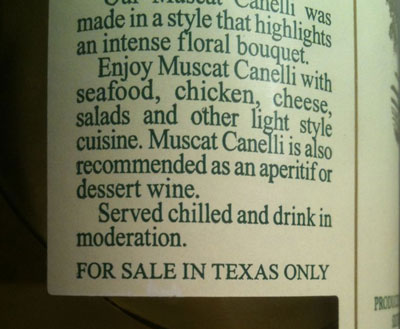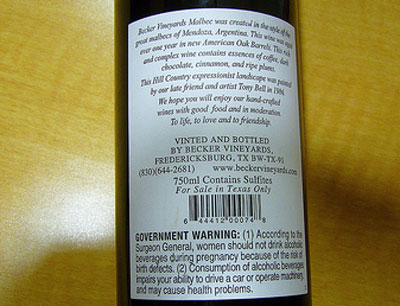
What’s on Your Wine Labels: From Appellation to “For Sale in Texas Only”
I get more emails about wine labeling than just about any topic. The questions can vary from….”What is the minimum amount of grapes a wine can contain?” to “If a wine’s label doesn’t indicate sulfites, does that mean it’s sulfite free?” Oh yes, my favorite Texas wine consumer questions are….”What Does For Sale in Texas Only mean?” and “Does that mean, it’s a special Texas product for Texans?”
Well, for wines sold in the United States, the authoritative source for wine labeling is TTB, The (Alcohol and Tobacco) Tax and Trade Bureau. It is part of the United States Department of the Treasury and it’s their job to review wine labels and advertisements to make sure that they provide adequate and correct information to the wine-consuming public. They also (supposedly) conduct product integrity field investigations to make sure that wineries are following all Federal labeling and production standard for alcoholic beverages.
TTB also has a very informative brochure called, “What You Should Know About Wine Labels” which summarizes the applicable wine regulations as defined in the Code of Federal Regulations (CFR – usually pronounced “See-fur”). Click here for a link to this document. Here are a few of the important points highlighted in the TTB brochure.
“Vintage Date” indicates the year the grapes were harvested. If a political region is given on the label (e.g. state, county or American), 85% of the grapes need to be from that year’s production. If the label cites a viticultural area (e.g. Texas High Plains, Napa Valley, etc.), 95% needs to be from that year’s vintage.
“Estate Bottled” shows the consumer that 100% of the grapes came from the land owned or controlled by the winery, which must be located in a viticultural area.
“Appellation of Origin” is another name for place from which the grapes used in the wine originate. If a political region is used (country, state, etc.), then 75% of the grapes need to originate from within that location.
“Viticultural Area” is a defined grape growing region (in the USA it is called an American Viticultural Area or AVA) which has been definedto have specific climate or geological features; 85% of the grapes used in making the wine needs to come from that region if designated on the bottle.
“Varietal Designation” is the naming of the wine based on the primary grape used in the winemaking process if the intention is to have the wine carry a singular grape designation, such as Cabernet Sauvignon, Chardonnay, Tempranillo, etc. A varietal designation also requires an appellation designation be stated and that at least 75% of the grapes used to make the wine were of that particular variety.
“Declaration of Sulfites” is required on any wine intended for interstate commerce that contains 10 or more parts per million sulfur dioxide. IMPORTANT: It is not required for wine sold in intrastate (within the state) commerce.
One of the most under-understood aspects of federal wine labeling requirements is that (as in the case of the declaration of sulfites) a winery can seek an exemption from nearly any of the federal wine labeling requirements if the wine is going to be restricted to intrastate sales (Click here for TTB label exemption form). One of the most common exceptions requested by wineries in developing wine states is to be exempted from indicating the Appellation of Origin. So long as the wine in sold only within the state, TTB will generally provide an exemption which allows the winery to use grapes from any place, state or region it wants with no appellation of origin indicated on the label. However, the label will have to display the words “For Sale in XXX(name your state) Only”.
A Point of Confusion or Deceptive Labeling (Your Call)
Here is where the confusion starts. If wine consumers read “For Sale in (let’s say) Texas Only”, they can be confused to thinking (and I’ve heard this statement many times from consumers) that the wine is a special product intended for wine drinkers within the state, or else why would it say exclusively for sale in Texas on the label. The line of logic goes even further when the wine consumer thinks (or has been erroneously told by a sales person) that this wine is a special product originating from Texas intended for Texans. Sounds logical or (again) why else would this wine’s label say For Sale in Texas Only!
You can generally apply the same reasoning to wines from any state, and I’ve seen wine labels on wines from Colorado, Maryland, Virginia and Missouri that have “For Sale in (name your state) Only”. The reason for employing the words “For Sale in (name your state) Only” is usually the result of a shortage of wine grapes available in the state, particularly if the most popular grape varieties such as Cabernet, Merlot, Chardonnay and Pinot Noir, do not grow well or economically in your state. I will also acknowledge that in certain years (like in Texas 2009 due to freeze and 2011 because of heat and drought) enough local grapes are not available. This is part of the challenge to developing a local wine industry that is sustainable and economically justified; but, let’s be totally honest about it, particularly with wine consumers that don’t know the ins and outs of the federal wine labeling laws.
My suggestion is that, if wineries have to seek grapes outside of their state, to use less ambiguous labeling that incorporates the term “American” as the Appellation of Origin rather than the confusing “For Sale in (name your state) Only”. All I ask is, if you see “For Sale in (name your state) Only” on a bottle of wine (usually on the back label), politely call or email the winery and ask their representative in the future to consider the use of American Appellation to label their wine. It doesn’t mean that it’s inferior or better wine, it is just comes from grapes that originate somewhere in American other than within your state (in my case Texas).
I am starting to see some progress in this regard. The largest premium winery in Texas, Llano Estacado Winery, has recently started to use American Appellation exclusively on any of their wines that cannot qualify to be made Texas appellation. However, we have several other large wineries in Texas that are widely distributed to wine shops and supermarkets around the state that continue to use the misleading label designation “For Sale in Texas Only”.
Consumers, it is up to you. If you don’t care where the grapes in your wine come from, then just ignore me and consider this another one of the Texas Wineslinger’s rants (or manifestos). If you want to spend your money wisely, promote truth in labeling, and hopefully encourage the planting of more Texas grapes (so that there eventually be less of a need for Texas wineries to brand their wines American appellation), I ask you to use your personal influence and power of your pocketbook to help make a change. Oh yes, I let me know what you think….Cheers!
For more on this subject at Vinotology.com, click here.


For those people who understand the wine labeling and care about where the grapes come from, isn’t labeling it American even more confusing? “For Sale in xxx Only” means 25-75% of the grapes come from that state whereby if it has less than 25% it has to be labeled American. Like you said, you can label the 25-75% range American if you want, but if we’re hoping to see greater than 75% so it is (let’s say) Texas on the label, I would think it would be more confusing to see American. That doesn’t tell me if it is less than 25% or in that 25-75% range. They just need better words instead of “For Sale in xxx Only.”
BTW, more information on this topic can be found at the Wine Curmudgeon at http://www.winecurmudgeon.com/my_weblog/2011/07/regional-wine-labels-is-a-wine-where-it-says-its-from.html
I think Russ’s point was that if your not specific enough to use a vineyard (95%), AVA (85%), or state (75%) as an indication of the wine’s origin, then American would be the most appropriate (for bulk sourced inside the US). I agree with Russ, I think that if you saw Becker or Llano or whoever’s label, and it said American instead of “For sale in Texas Only” on the back label, it would be less confusing (or deceptive) for the consumer. The customer who is unaware of the “For Sale in Texas Only” loophole would not be able to assume that Iconoclast is from Texas, because it would clearly state “AMERICAN” on the front label. Problem solved, no deception.
Maybe better words would be…
“For those who don’t care what’s in this bottle, this is a wine for you!”
Russ
While I generally agree with what you have written with regards to For Sale in Texas only, it is important to point out that there are other reasons this is used. In our case, Black Spanish is not a recognized varietal by the TTB and can’t be used without get this exception.
The approved varietal name for Black Spanish per TTB regs is Lenoir. If you didn’t want to go For Sale in Texas Only you could use Lenoir as the varietal name and then you could even put Texas or your county or AVA on the bottle. That’s sounds like a better way to go, better for all involved. In fact, Lenoir may be an easier sell (it sounds French).
Russ
For now, all of my Black Spanish sells in Texas. Most likely always will. I am happy with calling my wine Black Spanish and ok with “For Sale in Texas Only”. Even if you use “For Sale in Texas Only”, you can still put Texas on it (or the county). I just think it is important that everyone understand there are a number of reasons why a winery might apply for label exception.
There are reasons for using For Sale in Texas Only, that is not my point. The point is that it confuses the consumer that may want to know what’s in the bottle. There are effective alternatives if the wineries deems the consumers viewpoint of interest.
Thanks for reading and commenting on VintageTexas.
Russ